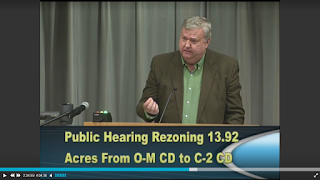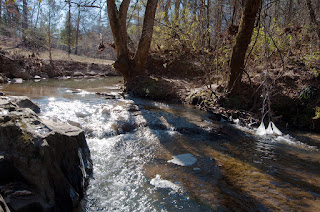Gaston Outside, City Version: Rewarding Threats to Clear-Cut Woods by Giving those Threatening a Shopping Center
Despite assurances from their first meeting with neighbors in
January that they would do a commercial project and help with flood control,
Pearson Properties made clear early on Thursday that flooding was not their
concern. Charlie Pearson gave the
initial presentation for the developer and said that “neighbors had purchased
into floodplains and that floodplains flood.” I pointed out that last year’s
Commission spent a long time during the Academy Sports review talking about
increased flooding concerns. Seventy
minutes of our required neighbors meeting with the developer had been filled
with people worried about greater frequency and intensity of flooding. We were worried that we did not know any
details of Pearson’s solution that they proposed to us and city councilmen - the
building of a retention pond of unknown dimensions on the city-owned land
upstream and buffering the Lineberger parcel from neighbors. They had compared the idea to what they had
done at Target and that scale concerned me.
Stunningly, Joe Pearson then got up and announced that his
flood expert had determined that water was flowing too swiftly into that basin
to add effective flood control there and they weren’t going to do anything for
flood abatement. Whether that was a
decision we were not informed of but City knew about, or whether it was the
spur of the moment way to save money on a vote he could win without it, I do
not know. I do agree it is a bad spot to
catch and slow a torrent.
Pearson had a hydrology expert from Mt. Holly, Robert
Billings of New River Engineering, “swear on his credentials as an expert”
there would be “no rise” in the 100-year flood line in the area as a result of
their construction. He also added no new
100-year flood line survey would be done by FEMA there for another four years,
despite our repeated requests for one since 2015 (and assurances with dates
that vary at every speaking). This same
expert retroactively assured Council two years ago that all the earlier
emergency riprap and reinforcement on the hill under the AAA garage had also
caused “no rise.”
Details of the Pearson proposal were not mentioned by the
proponents or staff, other than the limits on total square footage of the building
in the development (which I conceded was an improvement from the owner’s most
intense commercial proposal ever – though I do not know if it could be amended
once a zoning change occurs); a pedestrian walkway; and the addition of
greenery to the initial plan. I pointed out that if the plan’s scarcity of
details (no retaining wall heights, no detention pond depths, no fixed tenants)
had been by developer “x” rather than “just trust Joe,” the Commission might
have had more questions, and that that unknown developer standard should be the
legal one.
But all that detail discussion evaporated - other than
member Epstein saying this was best commercial proposal he had seen of the
several from the owners - once Joe Pearson said the property will be clear-cut
because of an agreement that requires them to do so by the end of the year. It did not matter that the owners cut date
was based on the assumption they would be building Academy Sports after their
2014 gift over to the City of a buffer around the parcel. The same parcel had sat heavily subsidized by
taxpayers as woods for forty years. It
did not matter the owners could change the cut date if they wished, or that neighbors
present, when asked, said the woods would regrow and they could wait it
out.
Commission member Fleeman was quite concerned about the
environmental blight this clear-cut would cause, and the horrible runoff from
these 14 acres into the creek. “You
don’t know what you’re asking for,” he said.
In fact, the 300 Lineberger acres north of I-85 have been clear cut and
environmental Armageddon didn’t happen.
Truth is, neighbors had a 200-foot buffer of City trees between them and
the lack of woods, but drivers on Franklin Boulevard would have not. That last
fact was never said. Instead the vote
was “this clear cut is horrible and we must not allow that to happen.” The threat may not have been the only factor
for approval. But in the discussion, it
was the overwhelming deciding factor. Is
that how zoning decisions should be made?
Glad Academy Sports wasn’t up this go-around.
My Gazette letter and blog article on “Keep Franklin Woods”
- and my conversations with folks at the Catawba Riverkeepers and Catawba Lands
Conservancy – convey that a purchase by the City could have been economically feasible
and quality of life preferable for our area.
This week’s results tell that saving the Lineberger parcel for
exclusively wooded or non-commercial use is not now likely. But as the evolving concerns during this one
meeting over how the City might use that wooded buffer around the parcel show,
there are 27 acres of woods around that Lineberger parcel that the City is
still willing to put at risk.
What might we gain by forcing one more meeting on this
topic? It will allow us to perhaps maybe
get the word around to a few more people what our City could have, should have,
and would have done with those woods.
And that it still has things it promised and can do to insure the safety
of residential and commercial investment near there.
1)
Gastonia City Councils could have
had more concerted effort to keep the entire area south of Franklin wooded, as
was the initial agreement between the owners and neighbors years ago, and which
residents have enjoyed as a buffer for many years. That buffer was heavily subsidized
by tax credits to the owners but could have been secured in perpetuity had our
community valued greenspace in this sensitive environmental location with an
economic investment to match its stated visions in long-range planning. Compared to the $4 million land investment in
FUSE, and some public percentage of another $15-20 million forecast for the
same, the $700k-1 million needed to have bought this uniquely located parcel is
light.
2)
The 2014 Gastonia City Council should
have never accepted a land gift around the Lineberger parcel and made
assurances that that would be rezoned commercial. This was an attempt not just to remove a
legal right available to residential neighbors to demand a supermajority vote for
a commercial zoning change. This was an
attempt to force a zoning vote result as well.
Planning Commission this week voted much more to avoid a threat than to
affirm a choice. The difference between
a favor and blackmail may be whether you want the offerer’s desired
result. Suffice it to say this did not
look like a favor to neighbors. And next
time, a developer may use a similar threat strategy to get a result not wanted
by City leaders. The reasoning for the
vote sets a horrid precedent.
3)
Despite assurances in 2015 that they were preserving the 27 acres as a
wooded buffer between commerce and neighborhoods, a Duharts Creek Conservation
Area, this council and City would have
been willing to give away land it owned and woods that buffered back to the
developer to build a retention pond to make this project happen. Talk about chutzpah. Owners give away land to get a project
rezoned more easily, then ask for part of the land back to do a flood control
effort to get the rezoning a reality.
That’s how addicted to this parcel being commercial – whatever, however
– some in our leadership are. The Pearson developers backed away from that part
of the sell at end. But if they say
later that the area does need flood reduction, they won’t be paying for
it. The City will. And the City’s first instincts may be to say
they are too poor to incentivize detention basins upstream in one of ten
already surveyed sites in the Duharts Creek Urban Runoff Initiative. No, they will be tempted to cobble a cheap
solution in the City-owned part of Franklin Woods.




Comments
Post a Comment